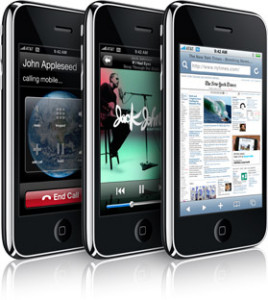The iPhone Changes the ball park for Mobile Analytics

I’ll start this post today by saying that I’ve got a new iPhone. Is it great? Well it is according to cnet, and not so according to others. Needless to say, I am impressed because I’ve gone from a horrible old Sony Erikson K600i to a modern phone for the first time in 2 and a half years. Having said that, I did have to go through the nightmare process of changing networks (because my old one didn’t sell an iPhone), porting my number across and moving all my contacts across. But I am finally back in the 21st century. Needless to say, I think the iPhone is going to change how we think of mobile analytics.
Traditionally Mobile Analytics is difficult. June Dershewitz has a very good post on her blog about mobile analytics and the challenges we face at the moment.
Primarilly amongst the major issues was people like me using old phones like the one above. Why was that an issue? Because we were using strange browsers that wouldn’t render the pictures properly. We were getting other systems to transfer images into smaller formats so that we could view them over our shitty GPRS systems. Needless to say, most of the time we weren’t even loading javascript.
What did this mean for mobile analytics? Well firstly it meant that we had to set up systems that could detect mobile usage. This meant either:
- Putting your old style noscript tags on pages – this usually works best for those that set up mobile versions of their site. You can do some clever user agent detection and redirect users to a mobile site (low on pictures, etc to speed up the process). The downside is that you still don’t really have a unique identifier (no cookie), the useragent is too consistent across browsers and the IP is too inconsistent across the same browser. Therefore you have to use more than these two things to get a unique user (like Bango do)
- You do some packet sniffing. This has a whole host of privacy issues and hence has always been something that I am reluctant to get involved with (if I am finding out stuff about what you are doing on my sites, I could find out a whole load more too that could infringe on your privacy using this method)
What are the big Web Analytics players doing about this? Well the news today is that Omniture have announced that they have a new tool that can be used for this very purpose. Stephane Hamel has yet again written up a very nice piece on what he thinks this will do to the world. The important piece out of this is the integration factor – mainly I would say in terms of support (both in house and from the provider).
But I think that this announcement is too late. I think the iPhone will change the whole arena for mobile analytics. Why? Because the iPhone runs javascript, it accepts cookies (it doesn’t run flash rather annoyingly), but overall because it is actually an internet experience. You are browsing the ‘web’ on your iPhone as opposed to the ‘mobile web’.
What difference does this make? It means that you should be able to track it in the same conventional way that you do with all your other web analytics – they can run on javascript tags that look at cookies and you can link what the person is doing. The analytics will be simple.
And the real reason I think that the iPhone will change mobile analytics is that because you can do it on the iPhone and because the iPhone is so cheap, all the other people making phones who isn’t already doing these things will have to from now on otherwise they’ll be out of the market. Who is going to get a new phone which can’t do the new basic standard (which this surely is).
In the UK I reckon most people keep their mobile for 12 – 18 months before upgrading. That means that in the next 12 to 18 months everyone who hasn’t already got a phone with a 3G capability and a browser that can load javascript and accept cookies is going to get one. In the US, I am expecting similar things, Europe should close behind. In the emerging markets over in India and China, this will probably take a bit longer. In 12 to 18 months we won’t have the issues that June talked about in her post.
In the meantime I’m going to go back to playing with my new 3G iPhone.



The problems I wrote about in my post (the one you’ve referenced) are most certainly temporary – but they are damn frustrating while they last! I look forward to the day when all of our phones run javascript and accept cookies.
I’ll direct you to this great post by John Marshall of Market Motive; he has expressed similar sentiment (and iPhone praise): http://www.marketmotive.com/marshall/2008/05/12/mobile-web-is-no-longer-special/